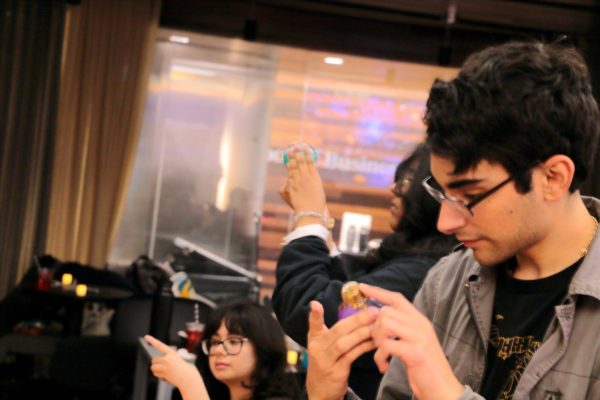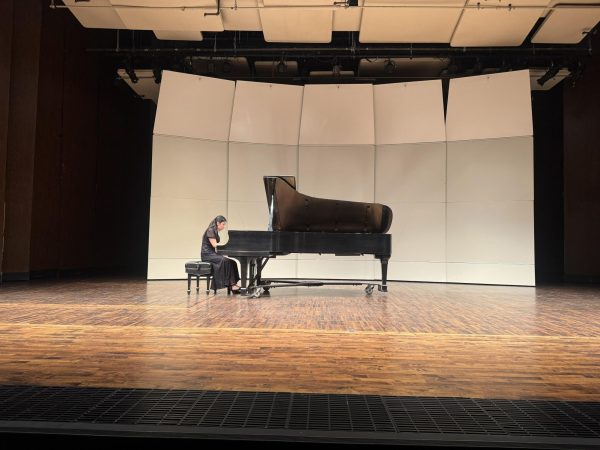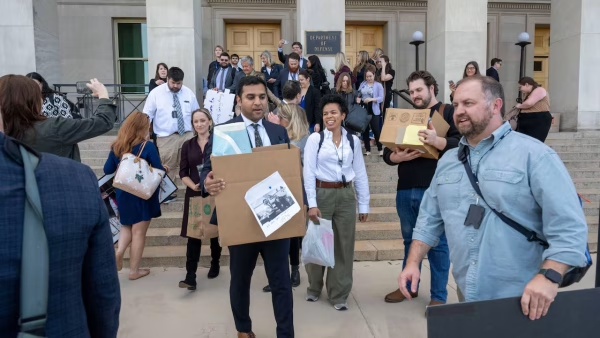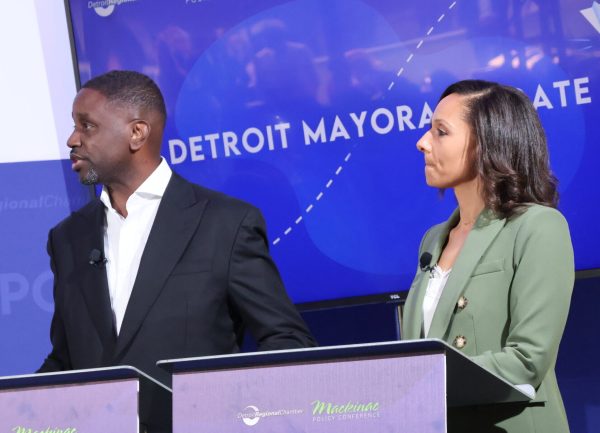Faculty contract finalized, relationship between faculty and administration still strained
The new faculty contract for 2021 through 2024 is now official. The way negotiations unfolded has left a bad taste in the mouths of faculty.
The new three-year faculty contract agreement for 2021 through 2024 is now official, with OU’s chapter of the American Association of University Professors (OU AAUP) voting in favor of ratification on Sept. 30 and the Board of Trustees (BOT) voting to ratify the agreement during Monday’s BOT meeting.
The agreement comes on the heels of a nasty negotiating period between the two sides that ultimately led to the faculty work stoppage that delayed the start of the fall semester. While the agreement is now finalized, the relationship between OU AAUP faculty and President Pescovitz’s administration was significantly damaged by negotiations.
Faculty discontent with the administration is evident in the vote tallies for ratifying the new contract agreement. Out of 739 eligible voters, 558 ballots were cast. Voter turnout was approximately 75%, which is a high number indicative of faculty interest in the agreement. Out of those 558 votes, 448 (80%) were in favor of the agreement and 110 (20%) were against it. That 20% “no” vote number is historically high.
“Historically, [75% is] a pretty good turnout. I was actually shocked because … people were really angry,” OU AAUP President Karen Miller said. “… But typically, we get far fewer negative votes.”
Also worth noting is that a significant portion of those who voted in favor of the agreement were voting in support of the union bargaining team and having a contract, not because they thought the university had offered a fair deal.
Aspects of the deal that faculty were happy about included finally receiving paid parental leave, and the protections that the bargaining team won for Special Lecturers. They were dissatisfied with the merit based increases to salary that were offered.
“There was great unhappiness with the lack of significant salary improvements and the nature of those improvements,” Miller said. “Faculty believes that the merit system is designed, essentially, to occupy our time. It’s very time consuming, particularly in some departments, to fill out those forms. And you know, you’re fighting over a few dollars a year.”
Speaking to the current state of the faculty/administration relationship, responses to a recent OU AAUP workplace satisfaction survey were also telling. Results of the survey indicate that a majority of professors don’t feel: that they’re fairly compensated, that President Pescovitz and the BOT advocate on their behalf, that administrators are open to faculty-driven change, that administrators work with them to solve problems, that administrators value their input, that OU rules and procedures make it easier for them to perform their jobs and that administrators value the work they do as professors. The survey indicates that communication is a major issue, as faculty don’t feel they can reach out to administrators about problems.
“We’ve got a huge problem here. Which is not [one] the union created,” Miller said. “This is a problem that, first of all, is very long standing. I’ve been here for forever, and I can remember years where we probably would have gotten similar [survey results] about exactly the same stuff. And it’s like, we try to be nice. We try to tell the administration that there’s an issue and we get this — ‘well, you know, we’re sorry, that you feel bad.’ And it’s very frustrating … the administration seems incapable of understanding that we’re upset.”
Apparently perturbed by the idea that faculty would dislike her after a months-long campaign to cut their compensation package was orchestrated by her administration, Pescovitz had the Office of the President email a communication out to faculty last Thursday morning in an attempt to bridge the gap between faculty and the administration.
Pescovitz wrote the following in the email: “I want to apologize to those of you who feel hurt by the negotiations. I am aware that some of you experienced feelings of disappointment, distrust and anger. I take full responsibility for not communicating more effectively how much I value each of you and all of your contributions, as well as how we must work together to foster a campus environment that supports your important work. I also should have communicated more often about the financial realities that both COVID-19 and a decrease in enrollment created on our ability to offer more generous salaries and benefits.”
Whatever Pescovitz’s intentions were, this message was not well received by faculty.
“It’s the first time I’ve ever seen [Pescovitz] do anything that approximates an apology. And so, there are some worlds in which we could think this is a good first step. But it was not handled well,” Miller said. “It still displayed a lack of understanding of where the anger rests, but at least it seemed to be an effort. The problem is so much of the language in it. If you study it, if you study counseling or if you study rhetorical strategy … It was the language that abusers use towards the abused. ‘If you were just a better person, I wouldn’t beat you.’ It wasn’t that bad, but it was that same kind of rhetorical framing. And so people who teach those areas flipped out.”
At this point, differences between the two sides seem insurmountable. Given the way negotiations unfolded, faculty don’t feel respected or appreciated by the university.
“It’s been really hard for me. Because I teach and I love my students, I want to spend all my time working with them, and working on my own research,” Miller said. “… I have to spend all this time trying to explain to administrators that [something] is a really stupid idea. And I can’t imagine a universe where that’s not going to be the case. I think the rest of my career at Oakland is going to be spent trying to explain to administrators how they don’t understand us, because I don’t think we’re that hard to understand.”
Given apparent ideological differences, it’s hard for faculty to see a path forward in their relationship with the administration. Many faculty believe that university administrators are not interested in working with them to ensure the health and longevity of OU.
“There are people on the [BOT] who have this imagination, that higher ed in the United States has to undergo a revolutionary transformation, that it has to be all consumer driven,” Miller said. “That you have to have a completely flexible workforce. That there’s no such thing as a liberal arts curriculum. That [faculty are] not consumers, nor are we the product. Okay, [that faculty are] sort of the guys in the Amazon warehouse that pack up your stuff. And they don’t understand why we object to being treated that way … There is absolutely no commitment to shared governance.”









Anon • Oct 16, 2021 at 4:12 PM
President Pescovitz has talked many times in public about the beautiful Judaic concept of tikkun olam, which means to “heal the world.” Unfortunately, in her mouth those words are stripped of their nobility and turned into a cynical, self-serving PR slogan. What else could we really expect from her, though? President Pescovitz was an executive for Eli Lilly from 2014 to 2017. In that short time, her company raised the price of insulin by 72%, even as the price to produce it FELL. Gouging diabetic patients does not heal the world, nor does gouging Oakland faculty and students. Dr. Pescovitz has shown us that narcissism and self-advancement comprise her worldview, not tikkun olam.
Anonymous • Oct 18, 2021 at 1:28 PM
I am quite certain that her belief system can be safely reduced to this: “Screw thy neighbor over and get away with it.” The only positive aspect of this whole debacle is that her actual value system has been made manifest, and no faculty festivals or other PR nonsense will change how faculty receive her “leadership.”
Anonymous • Oct 13, 2021 at 11:25 AM
I’d love to see any tangible, actionable expression of “taking full responsibility.” What I will most likely see, however, is increased admin salaries in the next “transparency” report. Also, for Pescovitz to tell us that we have to recommit to the OU values and thus to insinuate that we haven’t been committed is just low. Her “apologies” are yet another insult from the clique.